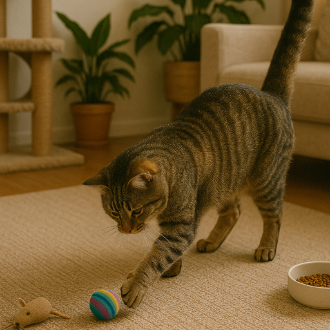The Fundamental Needs of a Cat: How to Ensure Their Well-being and Balance?
By Lost'Him Team • February 21, 2025

Cats are territorial and independent animals with specific needs to feel safe and happy in their environment. To ensure their well-being and strengthen your bond, it is essential to meet their fundamental needs.
Here are the key aspects to consider:
1. A Safe and Stimulating Territory
Cats are highly attached to their territory. They need to explore, observe, and rest without stress.
👉 Create an environment that promotes their well-being
- High spaces: Install cat trees, shelves, or perches so they can observe their surroundings safely.
- Hiding spots and shelters: Cats need places to retreat when they feel the need (cushions under furniture, cardboard boxes, cozy beds).
- Scratching areas: Scratching is a natural behavior. Provide suitable scratching posts (vertical, horizontal) to prevent damage to furniture.
💡 A cat with a well-adapted space and engaging activities will be mentally balanced.
2. A Balanced and Enriching Diet
Proper nutrition is crucial for a cat's physical and mental health.
👉 Provide food adapted to their needs
- Free feeding or scheduled meals: Some cats prefer having dry food available, while others benefit from set mealtimes.
- Ergonomic and interactive bowls: Using raised bowls or puzzle feeders stimulates their hunting instinct and prevents boredom.
- Fresh and accessible water: Cats prefer clean, moving water. A water fountain can encourage them to drink more and prevent urinary issues.
💡 A well-fed cat with a diet suited to their natural needs will be healthier and more relaxed.
3. A Clean and Well-Placed Litter Box
Litter box hygiene is crucial to avoid stress and inappropriate elimination.
👉 Provide an appropriate toileting space
- A clean and accessible litter box: Scoop daily and avoid artificial fragrances that may disturb the cat.
- A strategic location: Place the litter box in a quiet area, away from food and high-traffic areas.
- Choose the right litter type: Experiment with different textures to find your cat’s preference (clumping, plant-based, silica, etc.).
💡 A cat with a clean, well-placed litter box will experience less stress and fewer hygiene issues.
4. Respectful and Positive Interactions
Cats are sensitive animals that dislike being forced. Respecting their space and interaction rhythm is essential.
👉 Strengthen your bond gently
- Let the cat approach you: Allow them to initiate contact rather than forcing interactions.
- Use gentle gestures: Pet them according to their preferences (head, chin, base of the tail).
- Avoid punishment: Cats do not understand punishment. Instead, redirect their behavior and use rewards to reinforce positive actions.
💡 A cat respected in its social needs will be more confident and affectionate.
5. A Stimulating Environment to Prevent Boredom
Cats require mental and physical stimulation to stay balanced.
👉 Keep them entertained to avoid stress and frustration
- Provide a variety of toys: Balls, feather wands, lasers, interactive mice—each cat has their own preferences.
- Engage in regular play sessions: Playing for 10-15 minutes daily strengthens your bond and channels their energy.
- Secure outdoor access: A protected window, a secure enclosure, or a netted balcony can provide valuable visual stimulation.
💡 An active and stimulated cat will be better behaved and less destructive.
6. A Stable Routine to Reduce Stress
Cats thrive on routine and are sensitive to changes.
👉 Provide a stable and reassuring environment
- Stick to regular schedules: Consistent feeding, playtime, and interactions help maintain stability.
- Avoid sudden changes: Moving, new housemates, or environmental changes should be introduced gradually.
- Use calming pheromones: Diffusers like Feliway can help reduce stress during transitions.
💡 A cat living in a stable environment will feel safe and confident.
Conclusion: A Happy Cat for a Harmonious Relationship
- ✅ A secure and stimulating territory (high spaces, hiding spots, scratching areas).
- ✅ A balanced and enriching diet (proper portions, water fountain).
- ✅ A clean and well-placed litter box (away from food and busy areas).
- ✅ Respectful and positive interactions (gentle petting, no punishment).
- ✅ Daily mental and physical stimulation (playtime, safe outdoor views).
- ✅ A stable routine to reduce stress.
- ✅ Regular veterinary checkups to maintain good health.
💡 By respecting these fundamental needs, your cat will be happier, more relaxed, and more affectionate towards you! 🐱💛
 EN
EN  FR
FR